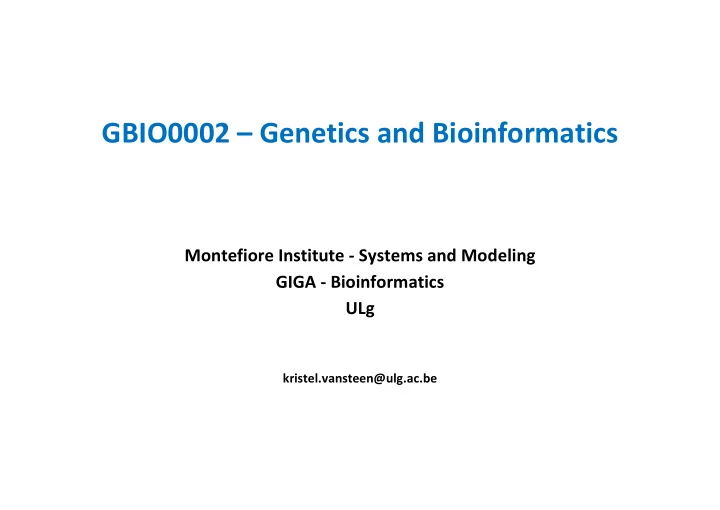

GBIO0002 – Genetics and Bioinformatics Montefiore Institute - Systems and Modeling GIGA - Bioinformatics ULg kristel.vansteen@ulg.ac.be
K Van Steen ITN MLFPM – September 2019 Administration • Course website 2019-2020: http://bio3.giga.ulg.ac.be/archana _bhardwaj/?Courses___2019_- _GBIO0002_- _Genetics_and_bioinformatics K Van Steen 1
K Van Steen ITN MLFPM – September 2019 Administration http://bio3.giga.ulg.ac.be/ [research BIO3] K Van Steen 2
K Van Steen ITN MLFPM – September 2019 Administration • Course instructors Prof. Kristel Van Steen - Office: level +1, B34 (GIGA tower) - E-mail: kristel.VanSteen@ulg.ac.be - http://www.montefiore.ulg.ac.be/~kvansteen Prof. Franck DEQUIEDT - Office: level +5, B34 (GIGA tower) - E-mail: fdequiedt@ulg.ac.be Teaching Assistant - Archana Bhardwaj - Office: level +1, B34 (GIGA tower) - A.Bhardwaj@uliege.be K Van Steen 3
K Van Steen ITN MLFPM – September 2019 Administration Complete online form: https://www.dropbox.com/s/nx7zdxbpcs60r25/List%20of%20GBIO0 002%20students%20with%20contact%20details.xlsx?dl=0 K Van Steen 4
K Van Steen ITN MLFPM – September 2019 Administration • Tutor-student commitments (progcours.ulg.ac.be) K Van Steen 5
K Van Steen ITN MLFPM – September 2019 What will we be doing? • General course content In this course genetic concepts are introduced that are necessary to understand a selection of bioinformatics related data analysis problems. To solve these problems a variety of analytic tools will be explained and exemplified. Different topics typically include: - The genome and genetic markers [genetics] - Genome-wide association studies [analytics] - Sequence technologies [genetics] - Sequence comparisons [analytics] - The transcriptome and proteome [genetics] - Gene co-expression [analytics] K Van Steen 6
K Van Steen ITN MLFPM – September 2019 What will we be doing? • General course content - Genetics + Analytics - Focus on ▪ Understanding key concepts / terminology and their context ▪ Interpreting findings / analysis results (NOT CARRYING OUT overly- complicated analyses) K Van Steen 7
K Van Steen ITN MLFPM – September 2019 How will we do it? “Theory” classes • The “theory” course will be interactive in English/French: - In class discussion papers (time permitting → computer!) - Interpreting analysis findings: discussing different viewpoints - Slides as supporting framework ( “ syllabus ” ) • Main instructors: - K Van Steen and - F Dequiedt K Van Steen 8
K Van Steen ITN MLFPM – September 2019 How will we do it? “Practical” classes • Application show-cases (computer!) • “ Homework assignments” : time-consuming part of this course and make links to the theory AND practical classes. • Main tutor: Archana Bhardwaj • Homeworks: 2 styles - Reading assignment with presentation and in-class discussions (graded) - Classic homework style (Questions / Answer) assignments (graded) • Homework assignments result in a “group” slides/report and should be handed in electronically in English • See also documentation on course website + next slide K Van Steen 9
K Van Steen ITN MLFPM – September 2019 … K Van Steen 10
K Van Steen ITN MLFPM – September 2019 K Van Steen 11
K Van Steen ITN MLFPM – September 2019 What will be evaluated? • At the end of the course, you have acquired knowledge about genetics (in particular genomics, transcriptomics, technology-related aspects) and about a selection of state-of-the-art, yet basic, analytic tools . • You will be evaluated about key concepts related to genetics and the analytic approaches presented during the course (incl. pros and cons, general contexts) and will be presented with a few analysis results to interpret . K Van Steen 12
K Van Steen ITN MLFPM – September 2019 How will be evaluated? HW1 HW2 Written Participation Exam Genetics Analytics Genetics Analytics 15 15 15 15 35 5 • No final grade without homeworks; No final grade without exam; Homeworks not handed in in time == ZERO (electronic submission!) • Written exam in January (terminology, basic analytic contexts, interpretation – see before; multiple choice / open questions; printed course notes as “open book”) • Second term exam: written exam + worst homework on Analytics + worst homework on Genetics K Van Steen 13
K Van Steen ITN MLFPM – September 2019 How will be evaluated? Literature style homeworks [homework = discuss a paper] • Discuss the paper in your slides • Make links - with other papers, - between the paper(s) and the course, - between the paper(s) and additional info outside the course K Van Steen 14
K Van Steen ITN MLFPM – September 2019 Evaluation criteria – presentation Criterium Key words Concepts, slides content, slides composition, fellow students do not have questions regarding “new” statements (i.e., not covered in class) made on the Clarity slides or during the presentation Illustrations Not too much; not only copy and paste from course on slide but novel illustrations; supportive Presentation Eager beaver (a person who is very enthusiastic about Skills doing something) Presentation content as presented is understood: Understanding adequate reply to questions and comments (incl. those from fellow students) Group Scoring will be done on an individual basis; balanced dynamics partitioning of tasks K Van Steen 15
K Van Steen ITN MLFPM – September 2019 Evaluation criteria – report Mainly refers to Q/A style of homeworks or in case of a second term exam one of the worst homeworks was a literature style homework. • Ability to formulate the research problem and to sketch the context (introductions, data description, tool description, etc) • Presentation summary of the analysis workflow (methods, analysis section) • Discussion (of the analysis tools, of the quality of the analysis, validity of results – when put in a broader context, …) • Creative input (stuffing, conclusion section) • General structure of the report (sectioning) K Van Steen 16
K Van Steen ITN MLFPM – September 2019 Critical evaluation of a paper or report K Van Steen 17
Recommend
More recommend